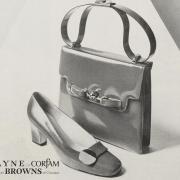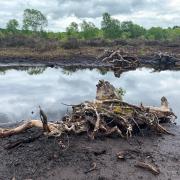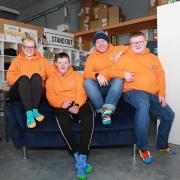The idyllic Wirral village built to house workers of the Lever Brothers’ soap empire was a model for philanthropy and good working practices. Leverville, its counterpart in Central Africa, showed a very different picture. This is the story of racism, the Belgian Congo, and William Lever
There’s a turn off the main road, south of Birkenhead that takes you west to Port Sunlight. This is the famed model village, and a now an award-winning tourist attraction, developed for the employees of the 1st Viscount Leverhulme. Originally William Hesketh Lever (1851-1925), the son of a Bolton grocer, made his fortune from soap manufacture, beginning with Sunlight Soap, and building a substantial business empire with brands such as Lux and Lifebuoy.
![William Lever, by now Lord Leverhulme.]() William Lever, by now Lord Leverhulme. Port Sunlight was established in 1889, home to some 900 Grade II Listed buildings in 130 acres of open space, park and garden and a key influence on the Garden City movement to come. It was in this sylvan setting, created by more than 30 architects, that the Lever Brothers workforce enjoyed sanitary, architecturally pleasing, picturesque housing, with welfare provision, extensive amenities and public buildings. The thinking from William and his partner brother James Darcy Lever (1854-1910), was that a happy workforce would be more productive – a quid pro quo where workers could flourish and give loyalty and commitment in return. Port Sunlight’s architecture, town planning and landscapes were a radical departure from the typical communities and facilities created for industrial working-class people, inspiring industrial and suburban communities around the world to the present day
William Lever, by now Lord Leverhulme. Port Sunlight was established in 1889, home to some 900 Grade II Listed buildings in 130 acres of open space, park and garden and a key influence on the Garden City movement to come. It was in this sylvan setting, created by more than 30 architects, that the Lever Brothers workforce enjoyed sanitary, architecturally pleasing, picturesque housing, with welfare provision, extensive amenities and public buildings. The thinking from William and his partner brother James Darcy Lever (1854-1910), was that a happy workforce would be more productive – a quid pro quo where workers could flourish and give loyalty and commitment in return. Port Sunlight’s architecture, town planning and landscapes were a radical departure from the typical communities and facilities created for industrial working-class people, inspiring industrial and suburban communities around the world to the present day
But the lifestyle of these residents of Port Sunlight with its Arts and Crafts cottages, surrounded by paths winding through fields and woodland, was in striking contrast with the conditions of the workforce in the Belgian Congo that helped fund the Leverhulme empire in the early 20th Century.
![Bringing in palm fruit in Leverville. Unilever PLC]() Bringing in palm fruit in Leverville. Unilever PLC Palm oil was an essential component of soap manufacturing and William Lever duly set up with concessions from the Belgian government in its colony in the Central African – Les Huileries du Congo Belge (HCB) – as a subsidiary of Lever Brothers. (James Lever had retired some years earlier due to ill health.)
Bringing in palm fruit in Leverville. Unilever PLC Palm oil was an essential component of soap manufacturing and William Lever duly set up with concessions from the Belgian government in its colony in the Central African – Les Huileries du Congo Belge (HCB) – as a subsidiary of Lever Brothers. (James Lever had retired some years earlier due to ill health.)
To ensure a regular supply of the raw material, Lever planned an African version of Port Sunlight grandly named Leverville. The 750 square kilometre area under HCB control, was five times the size of Port Sunlight but the Belgian regime had left the country and its people in a lamentable state, making it hard for Lever Brothers to recruit the willing workers needed to run a commercial operation, especially one based on low wages and hard conditions. Ultimately, HCB company managers resorted to forced labour, something that flew in the face of enlightened practices back on the Wirral.
![The Huileries du Congo Belge train bringing palm fruit from the plantation areas to the mill station. Unilever Plc]() The Huileries du Congo Belge train bringing palm fruit from the plantation areas to the mill station. Unilever Plc Now, more than a century on, the story of the Lever Brothers' colonialist enterprises and the role of the 1st Viscount Leverhulme – Liberal MP for Wirral (1906-09), patron of the Arts, philanthropist, Peer and industrialist – is being re-examined and retold. The Port Sunlight Village Trust, an independent charitable trust responsible for preserving and promoting the village, has produced a document called Racism, the Belgian Congo, and William Lever, and is making its research into the company's global story a central part of displays at the Port Sunlight Museum.
The Huileries du Congo Belge train bringing palm fruit from the plantation areas to the mill station. Unilever Plc Now, more than a century on, the story of the Lever Brothers' colonialist enterprises and the role of the 1st Viscount Leverhulme – Liberal MP for Wirral (1906-09), patron of the Arts, philanthropist, Peer and industrialist – is being re-examined and retold. The Port Sunlight Village Trust, an independent charitable trust responsible for preserving and promoting the village, has produced a document called Racism, the Belgian Congo, and William Lever, and is making its research into the company's global story a central part of displays at the Port Sunlight Museum.
In a statement in April 1911, the company set out its vision for its Central African workforce saying: ‘We need hardly to say that the natives will be well treated. Their labour will not be exploited to everyone’s advantage but their own. They will have their eight hours’ day, like ourselves. They will be secured the full rate of wages of the district, not only at the outset but as the improvement of civilisation in these regions necessitates, there will be a means of raising wages.'
![The HCB bulk-oil installation at the Port of Matadi. Palm oil arrived here by rail tanker or river boat, ready to be taken to Europe and America by ocean steamer. Unilever PLC]() The HCB bulk-oil installation at the Port of Matadi. Palm oil arrived here by rail tanker or river boat, ready to be taken to Europe and America by ocean steamer. Unilever PLC Yet forced labour was used from the very beginning, contravening Belgium’s Colonial Charter, which had banned the practice of coercing people into work. Colonial administrators, private companies, and even local chiefs, continued to exploit the Congolese.
The HCB bulk-oil installation at the Port of Matadi. Palm oil arrived here by rail tanker or river boat, ready to be taken to Europe and America by ocean steamer. Unilever PLC Yet forced labour was used from the very beginning, contravening Belgium’s Colonial Charter, which had banned the practice of coercing people into work. Colonial administrators, private companies, and even local chiefs, continued to exploit the Congolese.
Another indisputable fact is that racial stereotyping informed the markedly different treatment between Port Sunlight workers and their counterparts in Leverville. Lever's attitude is laid bare in correspondence of 1924: ‘The African native will be happier, produce the best, and live under the larger conditions of prosperity when his labour is directed and organised by his white brother who has all these million years ahead of him,' he wrote. William Lever’s African ventures may have had an altruistic root – a belief that Western methods could improve lives – however, what transpired on the ground was different.
![Houses built for Lever Brothers' workers at Port Sunlight. Paul Thompson/PSVT]() Houses built for Lever Brothers' workers at Port Sunlight. Paul Thompson/PSVT Jean Milton, director of heritage at the PSVT, says: 'William Lever is a hero for a lot of people, especially for those who have lived at Port Sunlight and grew up there. We’re still acknowledging the great things he did. He was forward-thinking in terms of working conditions and women’s rights. His company was, however, involved in some controversial business practices.
Houses built for Lever Brothers' workers at Port Sunlight. Paul Thompson/PSVT Jean Milton, director of heritage at the PSVT, says: 'William Lever is a hero for a lot of people, especially for those who have lived at Port Sunlight and grew up there. We’re still acknowledging the great things he did. He was forward-thinking in terms of working conditions and women’s rights. His company was, however, involved in some controversial business practices.
'He may have been too optimistic to begin with as to how things might work out in the Belgian Congo but the question is: how aware was he of how things developed? There’s some evidence he did have some awareness. Should he be blamed personally or was it the company’s fault? It’s still very much an evolving story but we’re aware of our responsibility and want to continue to take the story forward. New displays have recently been introduced within Port Sunlight Museum; there had been nothing explicitly telling this story previously.'
![Sunlight Soap products that built the Lever fortune were produced with palm olil from the Belgian Congo. PSVT]() Sunlight Soap products that built the Lever fortune were produced with palm olil from the Belgian Congo. PSVT PSVT’s research highlighting of Lever Brothers’ colonial enterprises is an ongoing project. As well as 'Uncomfortable Histories' talks, the display in the museum will continue to inform visitors. ‘Racism, the Belgian Congo, and William Lever’ (1st edition), published by PSVT in 2021, represented the start of PSVT’s mission to examine the problematic aspects of Lever’s business practices and highlight these in its public spaces. The trust says there remains much to uncover and looks forward to sharing whatever it learns as the research progresses.
Sunlight Soap products that built the Lever fortune were produced with palm olil from the Belgian Congo. PSVT PSVT’s research highlighting of Lever Brothers’ colonial enterprises is an ongoing project. As well as 'Uncomfortable Histories' talks, the display in the museum will continue to inform visitors. ‘Racism, the Belgian Congo, and William Lever’ (1st edition), published by PSVT in 2021, represented the start of PSVT’s mission to examine the problematic aspects of Lever’s business practices and highlight these in its public spaces. The trust says there remains much to uncover and looks forward to sharing whatever it learns as the research progresses.
Jean Milton says: 'The PSVT is committed to telling the fuller story of Port Sunlight and Lever Brothers’ colonialist enterprises, particularly in the Belgian Congo, exploring Port Sunlight's historic colonial links openly and inclusively. Black Lives Matter (2020) was a pivotal moment that gave the work extra focus although there was already a feeling the story must be told.
![The Global Impact display at Port Sunlight Museum. PSVT]() The Global Impact display at Port Sunlight Museum. PSVT 'An 18-month research partnership with the University of Manchester helped kick-start and drive forward our work and make the telling of the story possible. The story has always been there and there was work already going on, however, the work suddenly felt more urgent and was accelerated. We felt we needed to do more to tell the fuller story, even if it’s uncomfortable. There is a balance to be struck but it’s an uncomfortable truth that needs to be acknowledged and it is our duty to tell that story.'
The Global Impact display at Port Sunlight Museum. PSVT 'An 18-month research partnership with the University of Manchester helped kick-start and drive forward our work and make the telling of the story possible. The story has always been there and there was work already going on, however, the work suddenly felt more urgent and was accelerated. We felt we needed to do more to tell the fuller story, even if it’s uncomfortable. There is a balance to be struck but it’s an uncomfortable truth that needs to be acknowledged and it is our duty to tell that story.'
For Port Sunlight it has undoubtedly been a turn in the road but one it had to take.
*Lever Brothers is part Unilever PLC, the British multinational consumer goods company founded in 1929 following the merger of the soap maker and Dutch margarine producer Margarine Unie.
![Port Sunlight - award-winning tourist attraction. Paul Thompson/PSVT]() Port Sunlight - award-winning tourist attraction. Paul Thompson/PSVT
Port Sunlight - award-winning tourist attraction. Paul Thompson/PSVT



































